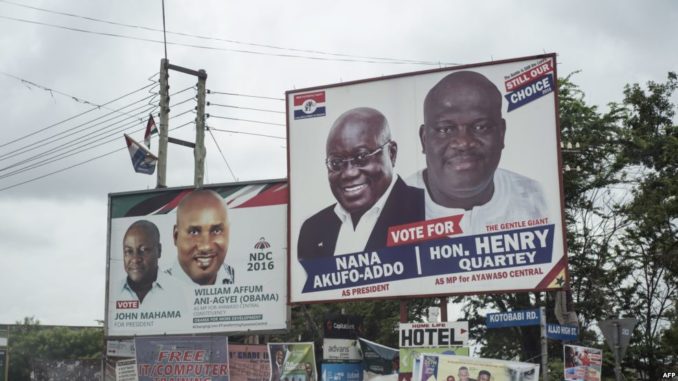
The International Standards Journalist Association (ISJA) has filed a petition at the human rights court seeking to prevent the electoral commission of Ghana from charging media accreditation fees for journalists who plan to cover the December 7 presidential, parliamentary and local polls.
Nana Oppong, leader of the journalists group, says the electoral commission is violating the constitution by imposing a fee, which he says also violates the fundamental rights of media professionals who want to cover the elections.
The electoral commission plans to charge each journalist GH $2.50 to cover the elections.
Charlotte Osei, the chairperson of the electoral commission, says the body does not have the funds to print the media accreditation for all journalists who want to cover the vote.
At an editors’ forum with media professionals, Osei said, “If you say we’ve received GHC693 million from the government…You would recall that the final budget that was approved between the EC, the Special Budget Committee and the Ministry of Finance was GHC1.2 billion, so clearly you now see the reason we need you to pay for your accreditation cards?…So please as good partners pay the GHC10 to ensure that you can move around the polling stations and do your work freely and ensure the difference between you and the voter on the election day.”
But in an interview with VOA, ISJA leader Oppong said the group resorted to the court after electoral commission officials refused to meet to resolve the group’s concerns.
“We wrote a letter to the electoral commission last week and we told them that we wanted to meet to discuss the issue of fees for accreditation tags and we want them [to] amend that decision. Because there are some journalists who cannot afford to make any payment. Remember, there are journalists who get paid GH 150 [$38] a month , and they don’t have money,” said Oppong. “We filed a case at the human rights court for relief. Essentially, what we are saying is the electoral commission bridged our constitutional right and we need an appropriate relief ordered by the court.”
Critics and some civil society groups say the electoral commission has the power to charge media accreditation fees since it is the only institution mandated by the constitution to organize elections. Since, the electoral body doesn’t have the needed funds to give free accreditation badges, they argued, it is incumbent on journalists to pay the processing fee to help the commission help the media professionals to carry out their duties regarding the elections. They also said journalists working at media organizations could have their employers pay for them.
Oppong disagreed. He maintains the electoral commission violated the constitution with its decision to charge fees. The Ghanaian constitution, however, states that operation expenses of the election commission shall be charged to the consolidated fund. Oppong contends that the constitution doesn’t give the electoral commission the power to make journalists pay for media accreditation.
“We cannot say because the electoral commission has the mandate to organize elections, therefore, it can do anything that it wants. It has to operate within the constitution …The constitution says if you have discretion and you want to exercise it you have to publish the criteria for the discretion and give people the opportunity to be heard. The electoral commission has failed to publish the criteria before this process, and it failed to give journalists the opportunity to be heard,” said Oppong.
“It looks like Ghanaian journalists are being discriminated against, because other journalists who are not Ghanaians are not being asked to pay for accreditation tags. And it is the right of every Ghanaian, journalists or not, to be able to supervise the election… We also have the right to information in the constitution, so they really bridged a whole lot of rights, and that is why we have to go to court.”
“If they had come to us and said poor journalists with a different kind of accreditation, that is acceptable, they don’t have to pay money, we are fine with it. But here is a case where everybody, whether you have money or not you have to pay. That is the problem,” he added.
- VOA
THE ROTTEN FISH: CAN OF WORMS OPENED OF APC & TINUBU'S GOVERNMENT OVER NIGERIA'S ECONOMIC DOWNTURN
WATCH THE CRITICAL ANALYSIS AND KNOW THE RESPONSIBLE PARTIES TO BLAME FOR NIGERIA'S ECONOMIC CHALLENGES, WHILE CITIZENS ENDURE SEVERE HARDSHIPS.Watch this episode of ISSUES IN THE NEWS on 9News Nigeria featuring Peter Obi's Special Adviser, Dr Katch Ononuju, 9News Nigeria Publisher, Obinna Ejianya and Tinubu Support Group Leader, McHezekiah Eherechi
The economic crisis and hardship in Nigeria are parts of the discussion.
Watch, leave your comments, and share to create more awareness on this issue.
#9NewsNigeria #Nigeria #issuesInTheNews #politics #tinubu THE ROTTEN FISH: CAN OF WORMS OPENED ...
DON'T FORGET TO SUBSCRIBE AND LEAVE YOUR COMMENTS FOR SUBSEQUENT UPDATES
#9newsnigeria #economia #economy #nigeria #government @9newsng
www.9newsng.com
